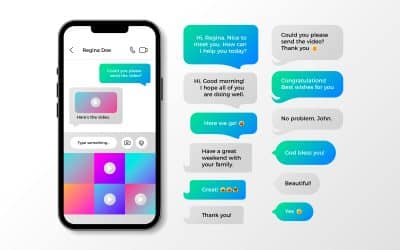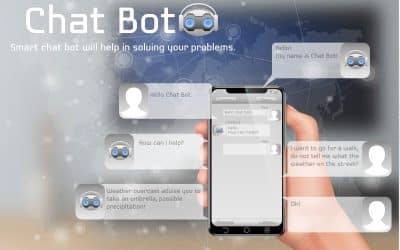Mobile applications have quickly become part of everyday life – regardless of our preferences – making mobile developers and owners work even harder to meet market requirements and remain profitable.
Over 8 Million Android and iOS Apps Are Now Available, and users continue to demand better developer experiences to increase user satisfaction and stay ahead of the competition; Artificial Intelligence can assist.
Statista estimates that artificial intelligence will reach a global market worth around $126 billion U.S. Dollars by 2025, underscoring its importance in app development and the industry.
Smartphones have become our companions at home and work, and Artificial Intelligence development services are revolutionizing how we interact with mobile apps. This transformation drives change across multiple industries while improving user experiences and broadening digital technology’s scope. This article will explore where AI and mobile app development meet and reveal how this powerful partnership revolutionizes app creation – unlocking infinite opportunities.
What Is Artificial Intelligence (AI)?
AI is the ability of a machine or system to mimic human intelligence. It can perform tasks the same way as a person would. AI apps can learn from their experience and improve based on the information they gather. AI-powered apps “think” just like humans to perform situational or environmental analysis tasks. They can also solve problems, learn, create perception, and understand language. Many experts predict AI will be the future of mobile app development.
AI is now manifested in many forms within mobile apps. Some examples include:
- Chatbots are AI-based systems that talk to users and solve problems, suggesting more efficient solutions.
- AI-based suggestions while typing text.
- Spam filters and smart email classification
- Face recognition in Apps
- Voice Search
Does AI Offer Opportunities to Mobile App Developers?
Apps with new features or benefits will expand quickly on the market. Integrating mobile Artificial Intelligence into your app might help you stand out.
According to market estimations, the mobile application industry is slowly shifting towards Artificial intelligence. AI is an excellent investment for businesses to achieve marketing benefits. Mobile app developers are heavily investing in AI-enabled apps, primarily due to the growing popularity of smartphones.
Mobile app developers, service providers, and solution providers focus on creating apps that enhance the user’s experience, engage users efficiently, and give them helpful information they are searching for.
AI mobile applications can analyze data to produce valuable insights and identify the behavior patterns of each app user. AI mobile applications have the intellectual ability to deliver significant domino effects without human assistance.
AI apps can adapt to new data sets and provide continuous and valid results. AI revolutionized the industry, and app developers could exploit increased market opportunities. Most mobile app developers invest in AI so that their customers can interact with them confidentially.
How do Enterprises Use AI?
Enterprises use AI to increase performance and productivity by automating tasks previously handled by employees. Artificial intelligence is increasingly used in mobile apps, as AI can now analyze and interpret more data than humans could ever imagine. AI systems can learn from past actions just like humans. These two AI capabilities provide a wealth of business benefits for enterprises.
Implementing artificial intelligence (AI) into mobile apps can add value to nearly every aspect of a business. Big brands like Google, Instagram, and Starbucks already use AI. Uber, Adidas, and Amazon also use AI in their mobile apps.
Even businesses new to AI and its innovations can reap significant benefits. Here are some AI applications that nearly every company is using for their mobile apps.
- Siri, Cortana, and Google Now are all smart personal assistants.
- Chatbots are automated responses for online customer service
- Purchase predictions and product recommendations
- Dynamic Price Optimization
- Pattern and Image Recognition
- Language Recognition – To digest unstructured data of customers and sales prospects
- Customer segmentation
AI is likely to continue developing rapidly. First, you only need to be willing to explore AI’s new possibilities. Chatbot integration and AI-enabled bots offer several benefits.
You should seek out an app development company with a team of AI experts if you are an entrepreneur who needs help in developing a strategy and gaining access to the right tools for your AI transformation. This team should comprise dedicated app developers, AI developers, ML Engineers, and Chatbot Developers with extensive industry knowledge.
Benefits of Artificial Intelligence in Mobile App Development
App developers and marketers better understand user behavior, which comes from actions, preferences, and purchases.
Deep learning is the science of “teaching” machines to recognize specific actions and then applying this “knowledge” to solve complex questions. It allows us to study user behavior and makes interaction with users personalized and accessible.
Quick Search
Modern users want to find the information they need as quickly as possible. Voice search has become a popular trend, and Siri and Cortana have been added to the Internet search.
Voice search has evolved from voice recognition into voice understanding. Companies are getting closer to transforming voice search into an “assistant that helps you in your daily life.”
It is essential to optimize websites for voice searches. It will soon become crucial for user experience and ranking on search engines.
Powerful App Authentication
Mobile apps that lack robust protection are easy targets for cybercrime. AI-powered security algorithms can help combat this problem. The authentication methods are based on data storage and user behavior patterns. This makes detecting malicious activities easier and sending users notifications in real time. AI can also enhance app security by using fingerprint authentication.
Conversational User Interface
Mobile apps with a conversational UI, built with machine learning and NLP technology, can significantly improve user experience and performance. CUI is used in chatbots and virtual assistants in mobile customer service, healthcare, and e-commerce applications. It allows customers to interact with an app naturally and intuitively using text and voice commands.
CUI makes apps more accessible for users with difficulty using traditional interfaces, including people with disabilities and limited literacy. Conversational UI has many advantages over conventional UI, including immediate help for customer questions and increased user engagement.
You must select a well-established artificial intelligence development company to ensure they can handle all technical challenges. Artificial intelligence is a complex technology requiring various mobile app development techniques. These include handling multiple requests from users while maintaining privacy and security.
Enabling Personalized Recommendations
AI algorithms can analyze the user’s behavior and preferences to offer personalized content, make product recommendations, or suggest actions within an app. As a result, this increases user engagement and encourages app usage. How does AI accomplish this in mobile apps?
AI begins by creating comprehensive user profiles through data analysis. This involves evaluating user behaviors, preferences, locations, and social networking activity. AI can predict users’ needs and desires if it understands them on a deeper, more personal level. It identifies patterns and correlations that humans find difficult to detect. These data include user interactions, click-through rates, search histories, and more.
Improved Efficiency
Integrating AI technology can significantly increase efficiency in mobile apps by automating repetitive tasks like data entry and content moderating. Developers can then focus their energies on more complex problems. AI-enabled apps can adapt to user behavior and learn from it. Businesses can create better solutions by anticipating customer needs. Virtual assistants and bots powered with artificial intelligence make it easier for businesses to keep up-to-date in app development processes while remaining responsive to individual consumer preferences.
Improve Daily Operation
Apps that use Artificial Intelligence can create advanced features to eliminate everyday risks and tasks. It also enhances the developer’s experience so the user can feel great satisfaction.
Suppose the app is all about travel. With the aid of AI, the user can view the different tourist destinations and places. This app can also help you smartly discover medical tourism.
Automated Reply Feature
Thoughtful reply or autoreply is another AI-powered feature that high-performing apps like Google Gmail use. The ability to choose from various auto-suggested replies encourages users to communicate through the app, saving them time.
Facial Recognition for Security
AI-based algorithms for facial recognition offer enhanced app security unlike ever before. This feature has been improved in many ways to address issues such as low-light sensitivity. Apps have become so sophisticated that they recognize faces with piercings, hair colors, and styles.
Emotion Recognition
Artificial intelligence can recognize and interact with human emotions, one of the most exciting benefits of mobile app development. The system can do this through advanced image processing, voice interpretation, and audio data interpretation. It can detect subtle facial and speech signals and recommend songs and movies that match the user’s mood.
Seamless Experience
These capabilities should create a seamless and personalized experience across all mobile platforms and devices. This will ensure consistency and a uniform user experience, regardless of which app the consumer uses. Artificial intelligence is a key component in mobile app development. It captures all technical and user events within users’ native apps.
Gathering the data required to analyze the app experience is crucial. For the integration of AI into mobile apps to be beneficial, the user interface must be improved, the app functionality refined, and personalized interactions made easier. AI can only be helpful in the future if it is used to revolutionize the user experience in apps.
Automate Repetitive Tasks
AI-powered apps automate repetitive tasks using machine learning algorithms. These algorithms can analyze large quantities of data and learn from patterns to perform tasks faster than humans.
AI-powered apps automate repetitive tasks such as data entry, scheduling, and other repetitive activities that can be time-consuming or prone to error when performed manually. AI-powered apps automate these tasks to increase productivity and give you more time to work on other essential tasks.
Use Cases for AI in Mobile App Development
AI is used to develop mobile apps in many ways, including Machine Learning (ML), Natural Language Processing (NLP), Computer Vision, and Speech Recognition. Machine learning algorithms, for example, can personalize mobile app experiences by predicting preferences and making personalized recommendations.
Here’s a detailed explanation of some standard AI technologies used in the development of mobile apps:
Voice Recognition
The technology of voice recognition (also known as speech recognition) allows mobile apps to recognize and understand human speech. Mobile apps use it for voice commands, dictation, and even interaction with virtual assistants. Mobile apps can be more convenient and natural to use with the help of voice recognition.
Machine Learning
Machine learning is an AI technology that allows mobile apps to improve and learn from user data without being explicitly programmed. Mobile apps use it to predict user behavior, provide personalized recommendations, and improve search results. Machine learning algorithms can identify patterns within user data and then use this information to improve the user experience.
Computer Vision
Computer vision is an AI technology that enables mobile applications to interpret and recognize images and videos. Mobile apps use it for facial recognition, object identification, and even augmented reality. Computer vision algorithms can analyze and interpret visual information, offering mobile apps a more engaging and interactive user experience.
Chatbots
Chatbots, AI-powered virtual assistants, can communicate with users via chat interfaces. In mobile apps, they can provide instant support to customers, answer questions, and handle transactions. Chatbots understand queries by using machine learning and natural language processing algorithms.
Natural Language Processing
NLP is an AI technology that enables mobile applications to understand and interpret human speech. Mobile apps use it for speech recognition, sentiment analyses, and language translation. NLP algorithms can analyze and interpret human language, allowing mobile apps and other software to communicate naturally and human-likely.
Top AI-Powered Frameworks for Mobile App Development
AI-driven frameworks, tools, and services have become essential assets for mobile application developers. Top mobile app developers use Artificial Intelligence (AI) to reduce coding requirements, simplify development processes, and accelerate app delivery.
We’ll explore the world of AI-driven frameworks, tools, and technologies to discover their capabilities and advantages for mobile app development. We’ll also discover the innovative and leading solutions that have revolutionized the app creation landscape.
TensorFlow
Open-source ML Framework that enables developers to create and train machine learning models quickly. The extensive library of pre-built APIs and functions makes performing complex tasks like image classification and voice recognition simple. Its ability to run across multiple platforms, including mobile devices, makes it a fantastic choice for mobile app development.
PyTorch
It is widely used for its user-friendly interface and dynamic computational graph, which makes it easy to build deep learning models. The robust GPU acceleration makes it a favorite among developers. It allows for faster training and experimentation. Its adaptability, user-friendliness, and ease of use have made it a favorite framework among researchers and developers.
Dialogflow
Google Cloud is the power behind this widely used tool. It is equipped with NLP (Natural Language Processing), which allows it to create robust conversational interfaces such as virtual assistants and bots. The software’s user-friendly interface and pre-built conversation models make it easy to develop AI-driven conversations. Its seamless integration with messaging platforms also facilitates the deployment of AI-driven conversations.
Top AI Technologies Developers Use for Mobile App Development
Artificial Intelligence software development has revolutionized the app development industry. We’ll show you the best AI technologies for making mobile applications more user-friendly and innovative.
Speech Recognition Technology
Speech recognition is an important AI technology for mobile apps. The advanced system used by virtual assistants such as Google Assistant and Siri allows users to interact directly with their devices through voice commands. The system converts spoken words into a format the computer can understand.
Numerous companies have seamlessly integrated this technology into their mobile app development, which shows its importance. This integration aligns with current AI trends, leading to enhanced user experiences.
Natural Language Technology
Integrating natural language technology into mobile applications will help to provide a satisfactory level of customer service. This AI technology allows applications to interact with users naturally.
Mobile apps that recognize human language can provide personalized solutions and tailored responses.
Generate AI-powered Chatbots
Chatbots are a valuable tool for mobile app development. These conversational chatbots can engage existing and new users and are designed to provide instantaneous responses to user queries.
Chatbots are developed with care to assist users in real-time. Mobile applications are integrated with AI-generated chatbots to improve communication and customer service.
Machine Learning
Machine learning is one of the most sophisticated AI technologies. It’s a cornerstone for many applications. Its integration into mobile applications has significant potential, particularly in tasks related to classification and prediction.
ML is a powerful tool businesses use that relies heavily on data-driven forecasts and insights to improve their app capabilities. Mobile apps can provide actionable insights and recommendations by integrating machine learning technology.
Reasons Why Businesses are Integrating AI in Mobile App Development
Artificial Intelligence, augmented reality, virtual reality, the IoT, and blockchain are integral components of all emerging technologies. Entrepreneurs are exploring new ways to integrate AI into mobile apps, such as chatbots, image search, or face recognition algorithms.
Hire chatbot developers for AI chatbots that will help personalize your digital interactions. Here are some ways to integrate AI and ML into app development.
Reasoning
Reasoning is the process of obtaining facts from data. Artificial Intelligence must incorporate reasoning to function as a brain. In an AI-based system, reasoning is used to solve problems using available data. Uber uses this method to optimize routes, match drivers and passengers, and regulate carpooling. This AI feature allows it to beat humans at games such as chess and poker.
Behavior
Artificial Intelligence can maximize revenue by learning how users behave in an app. Uber, for example, uses prior data to determine peak times and adjust prices accordingly. AI can also be used to improve the security of an app by analyzing the user’s behavior. AI-based apps can detect unusual behavior and stop a transaction if it is suspicious.
Recommendation
Artificial Intelligence (AI) and machine language are used in this way. It’s a prevalent and practical application. By collecting customer data, AI-based apps can recommend products and services based on past purchases.
Netflix, for example, uses AI to analyze users’ viewing histories and provide personalized suggestions. The user’s experience is personalized in many ways:
- the suggested videos and their rankings
- the videos are organized into pages and rows
- the ads displayed
Netflix increases the users’ viewing time by reducing their searching time.
Many companies, such as Nike and Amazon Prime, have found success by recommending what customers may need next.
Benefits of AI for Mobile App Developers
AI tools have made app development faster, easier, and more accessible. AI’s ability to analyze huge amounts of data, learn from patterns, and make decisions significantly benefits developers and users. We will explore some of the advantages AI offers developers.
AI-Driven App Design
AI tools are helpful in app design. They can create visually appealing interfaces and layouts based on the user’s behavior and preferences, resulting in an attractive and easy-to-use application. MidJourney AI will generate some impressive concepts for your mobile app interface. This is especially useful in the early stages of developing an app, as it lets you get a feel for its visuals.
Intelligent App Icon Design
AI can also help with designing app icons. It creates unique and engaging icons to attract users and increase app downloads. MidJourney, an AI company, can be used to create AI artwork, such as app icons and mock-ups. It lets you generate images and designs quickly and easily using text prompts.
Automated Code Generation
AI can automate certain coding aspects to reduce the time and effort needed in the development process. It can identify errors and provide solutions for everyday programming problems.
Breaking Down AI Integration Challenges
AI integration is a boon for Malaysian mobile app developers but comes with challenges. Let’s shed some light on this as well.
Data Acquisition
Data fuel AI models. However, gathering and generating this data is a challenge. ML models rely heavily on data to learn and make accurate forecasts. This data must be accurate, diverse, and relevant. Developers must also address the legal and ethical issues when acquiring data.
Operational Management
It’s not just about writing code to incorporate AI into your mobile app. This involves changing how teams are managed and how they operate. The development of AI-infused apps for mobile devices often requires the collaboration of data scientists, software engineers, and domain specialists. This adds a new layer to project management.
Application Portability
AI applications should be portable to different deployment environments. AI models are often complex to deploy to devices with various operating systems, hardware specs, and network conditions.
Selecting the Right AI Framework
The myriad options can make it challenging to choose the proper AI framework. Each framework has strengths and weaknesses. The choice is often based on the use case, type of AI model being developed, programming language, and computational resources.
A reliable partner in mobile app development can give you an edge and enable you to implement AI into your apps effectively.
Are Mobile Apps with Artificial Intelligence Getting Smarter?
The increased use of smartphones in the industry has led to the expansion of AI. Smartphone users spend a lot of time using apps. Companies are adopting AI in the hope that it will help them manage their customers more efficiently.
Mobile apps with AI or smart apps are gaining popularity in the industry and from the customers’ perspective. AI technology has improved the mobile app experience in the last few years. AI apps are easy to navigate and help users complete their tasks.
As app technology advances, users’ expectations are also rising. Users expect predictive mobile applications that can meet their needs.
Gartner states that by 2020, most technology giants will introduce AI-based mobile applications to meet changing user preferences. Starbucks and Taco Bell already have interactive and intuitive mobile apps that use AI. These apps analyze the user’s purchasing patterns and improve sales. Starbucks and Taco Bell have achieved high customer retention rates, profits, and ROI.
We can now imagine the level of competition in the industry. If your mobile app does not have AI, your customers might choose your competitor’s app. You can attract your customers with next-generation, high-speed AI mobile apps.
Future of Artificial Intelligence for Mobile App Development
Mobile applications have changed the way that businesses work. Statisticians predict consumers will download 2.9 trillion apps and games between 2021 and 2030. It’s no wonder the number is higher!
Therefore, businesses must continue to innovate and develop to meet customers’ demand for smart mobile applications. Customers are more interested in artificial intelligence mobile app development that offers more personalized services.
To stay competitive, you must be aware of crucial mobile app trends. The following trends will help businesses and developers improve by identifying the challenges and opportunities they face in the future mobile app industry.
The Key Takeaway
Global brands and tech giants are already integrating artificial intelligence into mobile apps and websites. AI will be the next technology revolution, perhaps even more important than the “Internet.” Machine learning and its inherent applications will continue progressing in our everyday lives. This is primarily due to mobile apps. You will either be left behind if you don’t embrace AI for mobile app development.
Elon Musk said it best: “We will have to decide whether we want to be left behind, effectively useless, or become a pet, you know, a cat in the house, or eventually find a way to merge with AI.”
Hire developers from Xonique to build AI-powered mobile apps that meet your business goals. We would be happy to answer any questions about Artificial Intelligence.











